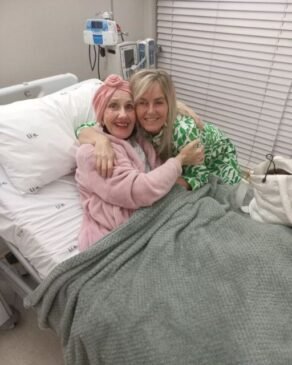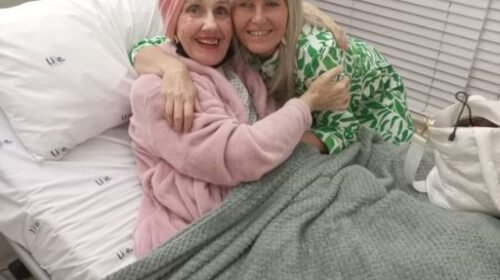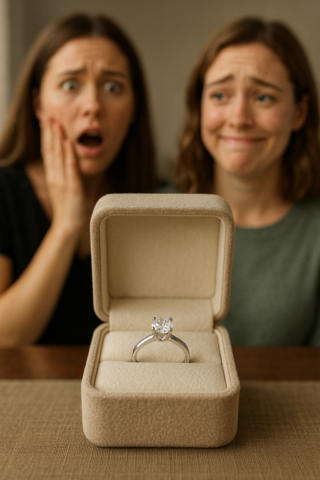When I walked into the hospital room that morning, she was already sitting up in bed, wrapped in that pink robe she refused to let the nurses wash. Said it made her feel like herself.
Her lipstick was freshly done—always a bright red, even now. But her hands trembled a little when she reached for mine.
“You came,” she said with a smile that didn’t reach her eyes. “I need you to keep something for me. Just for now.”
I glanced at her daughter, Mila, chatting with the nurse outside. The woman had barely slept in two weeks, running between work, her kids, and this hospital room. I didn’t know how to say no.
She reached for the small envelope on the bedside table, her fingers brushing over it like she was holding something fragile, something precious.
“I need you to give this to Mila,” she said softly, her voice shaking just slightly. “But not yet. Wait until… until I’m gone.”
My heart dropped into my stomach, the words cutting through me like a sharp blade. Gone. I wanted to argue. I wanted to tell her not to speak like that. But I could see it in her eyes—the same resignation I had seen in my own mother’s eyes all those years ago when she knew her time was coming.
“Why not now?” I asked, trying to keep my voice steady.
“Because,” she whispered, lowering her gaze, “I don’t want her to know everything. Not yet. I want her to have good memories of me, the happy ones. Please.”
I nodded, not fully understanding what she meant, but knowing enough to respect her wish. She was my sister-in-law, and I had known her for years. Always so strong, so put-together, even when life handed her more than her fair share of challenges. But this—this was different. Her battle with cancer had been brutal, and now it was clear it was something she couldn’t fight off.
I tucked the envelope into my purse, looking back at her as she smiled weakly at me.
“I’ll take care of it,” I said, trying to offer her some comfort.
Her smile returned, but there was a sadness to it, one that I couldn’t quite place.

The next few days passed in a blur. I came and went from the hospital, visiting her as often as I could. Mila, her daughter, never left her side, and it was clear the two of them had a bond that went beyond mother and daughter. They were best friends—partners in crime—and it hurt me to think about what Mila would face when the time came.
But I kept the promise I made to her mother. I kept the envelope hidden, tucked safely away, as if the act of physically keeping it would somehow protect Mila from the inevitable.
On the day my sister-in-law passed away, I found myself standing by the window, watching the sunlight shift across the sky. It felt unreal, almost as if everything had slowed down around me. I could hear Mila crying quietly in the next room, her heart breaking in ways that only losing a mother could bring. And still, the envelope sat in my purse.
It wasn’t until later that evening, when the hospital staff had done their part and the family had gathered, that I finally pulled the envelope out. It seemed heavier than it had the day she handed it to me, as if the weight of her final request had only increased over time.
Mila was sitting with her grandmother, her face pale and drained. She hadn’t stopped crying, and I didn’t know what to say to her.
I hesitated before walking over to her. “Mila, I need to talk to you.”
She looked up at me, eyes red-rimmed from crying, her voice barely a whisper. “Is she really gone?”
I nodded, biting back my own tears. “She is.”
Her lip trembled, but she didn’t break down. She was trying to be strong, to hold it together.
“Mila,” I said softly, “I have something for you. Your mom gave it to me. She asked me not to give it to you until… until today.”
I handed her the envelope, my hands shaking slightly. She took it, her fingers brushing over the edges like she was afraid to open it. I didn’t blame her. After everything, this little envelope felt like a final piece of her mother.
She stared at the envelope for a long time, her eyes scanning it as if waiting for something. Then, with trembling hands, she opened it.
Inside was a letter, written in her mother’s familiar handwriting. The moment Mila began to read, I saw the confusion, the pain, and then the understanding flood over her face. She read silently, her lips moving but not making a sound.
I waited, unsure of how to comfort her. What could I possibly say when her world was falling apart like this?
Finally, she looked up from the letter, her eyes wide with disbelief.
“Why didn’t she tell me this?” she whispered, her voice breaking.
The letter revealed something I had never expected. Her mother had kept a secret from Mila for all these years—one that wasn’t about her illness, but about her father.
Mila had always believed her dad had left them when she was little, a distant memory of a man who never returned. But in that letter, her mother confessed that Mila’s father had never abandoned them. In fact, he hadn’t even known about Mila’s existence.
It turned out, Mila’s mother had been pregnant with her when she had met a man—someone who had no idea she was carrying his child. In the letter, her mother explained how she had chosen to raise Mila on her own, protecting her from a father who might not have wanted to be involved, and keeping the truth hidden for years.
But that wasn’t the real twist. The real shock came at the very end of the letter.
“Your father has been looking for you,” it said. “And I’ve kept him from you all these years. I didn’t want to disrupt your life, Mila, but now, I think you deserve to know the truth. I hope you find him and ask him the questions you need to ask.”
Mila’s face paled. She set the letter down on the table, her hands shaking as she leaned back in her chair.
“What does this mean? My whole life… everything I thought I knew about myself—” Her voice cracked, and I couldn’t hold back my tears anymore.
I didn’t know how to answer her. I had no idea how to help her process everything that had just been thrown at her. Her world had just shattered, and she was left standing in the rubble.
But then, something in me shifted.
“I’m so sorry,” I said, pulling her into a hug. “But maybe… maybe this is a chance for you to find out who you really are. Maybe this is your opportunity to heal, to finally have the answers you deserve.”
Mila was quiet for a long time, just holding onto me. But slowly, she pulled away and looked at me, her eyes filled with a new kind of determination.
“I’m going to find him,” she said, her voice steady now. “I have to.”
I nodded, knowing this was the start of a new chapter for her. And maybe, just maybe, this was the twist of fate her mother had hoped for all along—the truth, finally, in the open.
Weeks later, Mila found her father. It wasn’t easy, and it wasn’t without complications, but eventually, they met. And when they did, it was like something had clicked. The connection was real, and although it couldn’t replace the years they had lost, it opened the door for healing.
The karmic twist was this: By revealing the truth, her mother had given Mila the chance to not only learn who she was but also to make peace with her past. And for Mila, that was the greatest gift her mother could have given her.
The lesson? Sometimes, the hardest truths are the ones that set us free. And even in the face of pain, there’s always a chance for growth, for healing, and for understanding.
If you’ve been through something similar, or if you know someone who has, don’t be afraid to share this story. Let’s remind each other that the truth, no matter how painful, is often the first step towards peace.















